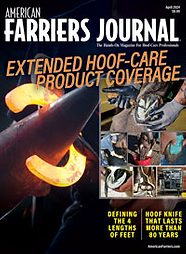Dennis Clymer has had a horseshoeing contract with the National Park Service for 40 years to trim and shoe horses used in parks like the Rocky Mountain National Park. Every year, the U.S. Department of the Interior’s National Park Service awarded him a $10,000-plus federal contract for farrier services.
After Dennis decided to retire last year, his son, Clint Clymer, took up the challenge and applied for the contract. In April, Clint was awarded the $11,145 contract to service horses and mules in Estes Park and Fort Laramie, Wyo.
“My father had the contract for 40 years and I took it over this year,” Clymer says. “I enjoyed that nostalgic part since he’s had it in the family for so long.”
He grew up around horses and the horseshoeing industry, and now he’s passing it on to his children, who enjoy helping him trim or just ride horses.
Clymer’s father retired from horseshoeing for the most part but still has a couple of riding stables he will handle this summer.
“He still goes harder than most young guys,” Clymer says.
Dennis will also assist his son with the contract this year, which Clymer finds funny because he was always the one assisting his father.
“Usually we’d split the herd and each do half and I was his assistant,” Clymer says. “This year I’m in the driver’s seat. It makes me very proud to do that.”
Clymer says the horses and mules are government-owned and used by the National Park Service for packing supplies up the trails and performing trail maintenance. Some are used up in Rocky Mountain National Park on the Estes Park side, by Grand Lake and at Fort Laramie.
“We’ll put three to four sets of shoes on them over the summer,” Clymer says.
The horses’ shoes are trimmed every 8 weeks, sort of like humans needing to cut their fingernails every few weeks. He says the animals wear out their shoes quickly since they are on the rocky trails.
He says some of the animals are tough, especially a half dozen mules that needed to be sedated to be worked on.
Since the national government worked with his father for so long, officials put Clymer down as a preferred contractor.
“Your work has to show for itself but at the same time,” Clymer says, “it didn’t hurt to have my dad be who he was.”

 By Loveland Reporter-Herald
By Loveland Reporter-Herald





Post a comment
Report Abusive Comment